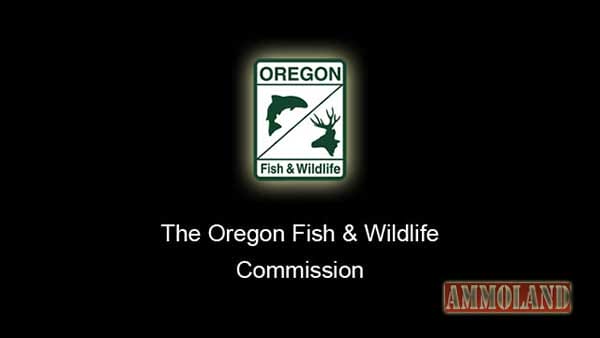

Salem, OR -(Ammoland.com)- The Oregon Fish and Wildlife Commission will meet Oct. 9-10 at the Jackson County Fairgrounds (Mace Watchable Wildlife Center, 1 Peninger Road) in Central Point to be briefed on wolf management and recovery, set 2015 big game hunting regulations and consider options for recruiting a new agency director.
Thursday’s meeting is a joint one with California Fish and Game Commission. Thursday’s meeting begins at 9 a.m. and Friday’s at 8 a.m.; see the Commission schedule page below for the meeting agenda on both days.
ODFW plans to stream a video of the meeting online; see the Commission page on ODFW’s website, just click here.
On Thursday, the California and Oregon Commissions will be briefed on Klamath Basin Restoration efforts, ocean acidification and temperature anomalies, and the Oregon Wolf Conservation and Management Plan. Finally, the group will engage in a roundtable discussion about issues of mutual interest including forage fish management, the Interstate deer herd, and salmon management.
Friday’s wolf briefing to the Commission will include a discussion about delisting wolves from the state Endangered Species Act, the process and timeline for the five-year Wolf Plan evaluation and public disclosure of wolf location information.
The Commission will also consider options for recruiting a new agency director. Roy Elicker, director since 2007, recently resigned to take a position with the U.S. Fish and Wildlife Service.
The Commission will also be asked to adopt 2015 Oregon Big Game Regulations. Among the changes being proposed are:
- Lift the long-standing closure to deer hunting in the Saddle Mountain unit north of Burlington Northern Railroad tracks, since the
- Columbia White-Tailed deer population it was put in place to protect has expanded.
- Add Siskiyou spring bear hunt (250 tags) in SW Oregon to better distribute hunting pressure in area with a good bear population and bear damage.
- Increase the statewide cougar quota from 777 to 970 to reflect increased cougar population, higher damage/public safety issues from cougar in some areas, and deer and elk populations that are below objectives in many areas.
- Removal and addition of several controlled deer and elk hunts.
- Add Keating Unit and remove Stott Mtn Unit from areas where hunters with a disability permit may take an antlerless elk during bull seasons.
Several proposed changes to archery season came about due to the recent Archery Review Public Advisory Committee process:
- Add three controlled archery deer hunts in Walla Walla, Mt Emily and Wenaha, where hunters are currently required to have a controlled elk archery tag to deer hunt. Tag would also be valid during the general archery season.
- New November controlled archery white-tailed deer hunt (estimate 30 tags, would be only archery deer opportunity).
- Sever link between archery deer and elk tags in Sled Springs, Chesnimnus, Maury, Warner units; archery elk tag would no longer be required to hunt deer.
- New Maury and Warner unit controlled archery elk hunts; tags would also be valid during the general archery season.
- Return Sled Springs, Chesnimnus, and Steens Mtn to the general archery deer season.
Finally, the Commission will consider a three-year pilot program that will allow the Oregon Department of Transportation to make specified culvert repairs without requiring full fish passage criteria compliance. As part of the programmatic agreement, ODOT would improve fish passage conditions at each site they repair, and pay $1.8 million into an ODFW-managed account that would fund high priority fish passage projects. In addition, ODOT would fund a new transportation liaison position, managed by ODFW, to coordinate the agreement’s implementation.
A public forum for people wishing to testify about items not on the agenda will be held first thing Friday morning, just after the adoption of temporary rules. Persons seeking to testify about issues not on the formal agenda may do so by making arrangements with the ODFW Director’s Office, at least 24 hours in advance of the meeting, by calling 800-720-6339 or 503-947-6044.
The Commission is the policy-making body for fish and wildlife issues in the state. Reasonable accommodations will be provided as needed for individuals requesting assistive hearing devices, sign language interpreters or large-print materials. Individuals needing these types of accommodations may call the ODFW Director’s Office at 800-720-6339 or 503-947-6044 at least 24 hours in advance of the meeting.
About The Oregon Fish and Wildlife Commission
The Oregon Fish and Wildlife Commission consists of seven members appointed by the governor for staggered four-year terms. One commissioner must be from each congressional district, one from east of the Cascades and one from the west of the Cascades. The Commission was formed July 1, 1975 when the formerly separate fish and wildlife commissions were merged. ODFW consists of the commission, a commission appointed director and a statewide staff of approximately 1000 permanent employees. ODFW operates under ORS chapters 496 through 513. Commissioners formulate general state programs and policies concerning management and conservation of fish and wildlife resources and establishes seasons, methods and bag limits for recreational and commercial take.
About the Oregon Department of Fish and Wildlife (ODFW)
Our mission is to protect and enhance Oregon’s fish and wildlife and their habitats for use and enjoyment by present and future generations.
